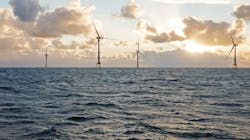NortH2 partners commission North Sea hydrogen studies
Offshore staff
COPENHAGEN, Denmark — Ramboll is assessing the feasibility of producing hydrogen offshore at multi-gigawatt scale with NortH2 in the Dutch North Sea.
The NortH2 consortium of Eneco, RWE, Equinor and Shell, in partnership with Gasunie, is investigating how all aspects of the hydrogen chain—from production to transmission and storage—can be developed in coordination.
They aim to establish a multi-gigawatt offshore wind farm connected to an onshore hydrogen plant, with the production distributed to industrial clusters in the Netherlands and Northern Europe.
By 2040, installed capacity of offshore/onshore electrolysis could be 10 GW, leading to annual production of up to 0.75 MM metric tons of green hydrogen.
And the consortium us also considering the feasibility of producing hydrogen offshore, with Ramboll charged with designing and describing feasible concepts.
“Projects using onshore rather than offshore electrolyzers tend to be less expensive, but as production scales, this might shift,” said Milko Binza Moussirou, senior chief project manager with Ramboll.
Among the concepts to be studied are electrolysis on an offshore platform and directly at the base of the wind turbines.
Ramboll will examined wind farm designs, electrolyzer technologies and hydrogen transport, and it will develop environmental impact assessments, along with levelized cost of hydrogen calculations, and business cases for each concept.
“When we have completed the study, we will be able to give NortH2 a full overview of their options in terms of the investment required, the most suitable technologies, the impact on their surroundings and a road map for how to integrate the offshore hydrogen production in the market," Moussirou said.
The feasibility study, due to finish this month, will support offshore hydrogen production plans for the Dutch North Sea in 2030-2035.
01.10.2023
